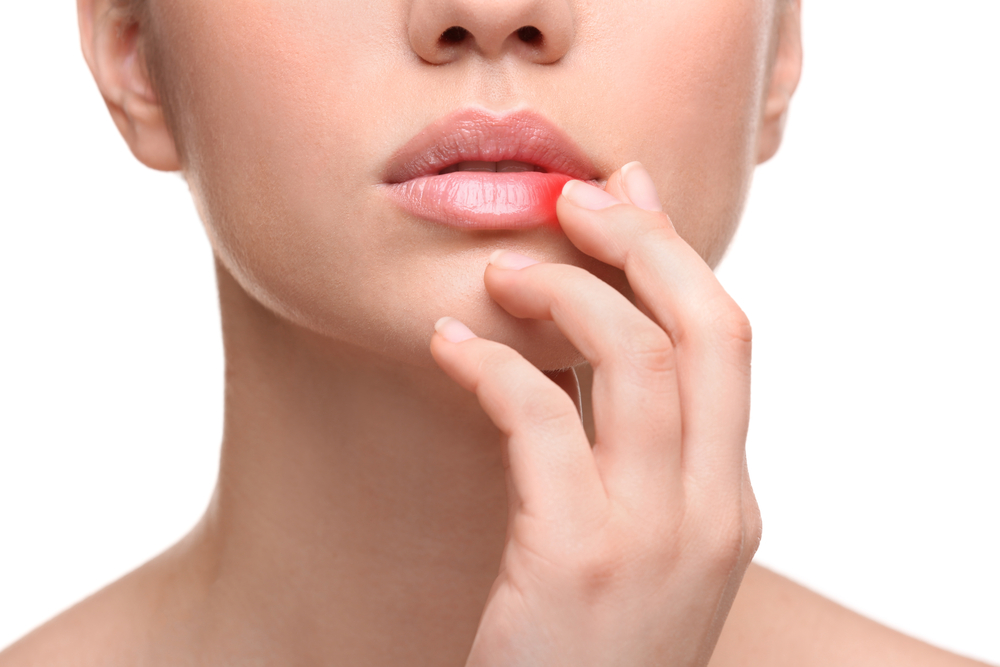Blog
Everything You Need to Know About Cold Sores
May 12, 2022 / DENTISTRY

Do you experience cold sores? If so, you’re not alone. According to the British Columbia Centre for Disease Control, studies estimate that nearly 90% of Canadians have been exposed to the virus that causes cold sores, and while this virus may never evolve into cold sores for many of these people, suffering from cold sores is a very common thing.
What is a cold sore?
Cold sores are small blisters that are filled with fluid, most commonly found on and around your mouth and lips. They can present as one single blister, or as a group of cold sores that appears like a patch on your skin. Like most blisters, cold sores will eventually break open, forming a scab that can last for several days.
I have a cold sore. Now what?
Cold sores can be very painful and avoiding certain foods can spare you a lot of discomfort.
These include:
- Citrus fruits – Imagine having a cut on your finger and accidentally filling it with lemon juice. Ouch. Well, eating citrus fruits when you have a cold sore is a very similar feeling.
- Pickled foods – Any pickled foods are highly acidic and will sting badly if they come in contact with a cold sore.
- Spicy foods – Spicy foods like curry and peppers can irritate the area around your cold sore, so best to stick with milder options while you recover from this virus.
- Large foods – The skin around your cold sores is delicate and sensitive, so avoid stretching it by opening your mouth wide to eat large foods like pizza slices or chips. Instead, opt for foods that come in small pieces or are easy to cut and bite.
Aside from avoiding certain foods, there are home remedies you can try to alleviate the discomfort caused by your cold sores.
These include:
- Over the counter anti-viral ointments – these are most effective if you start using them in the early stages of your cold sore.
- Pain relief gel – this is another over-the-counter option that can help numb the area and take away some of the sting.
- Ice chips, ice cubes, or cold compresses – use these to numb the area but avoid placing them directly on the skin.
- If your doctor recommends it, you can take over-the-counter pain relievers like acetaminophen or ibuprofen.
Most cold sores heal on their own within 2-4 weeks.
If you are overdue for a dental visit or want to discuss your cold sores with an oral health professional, call the team at Caledon Dental Centre today. We’ll assess your condition and work together to find a treatment plan that best meets your needs.
Archive
- Managing Tooth Sensitivity: Causes and Solutions
- The Surprising Link Between Oral Health and Heart Disease
- Proper Care and Maintenance of Dental Implants
- Exploring Cosmetic Dentistry: Procedures and Benefits
- The Benefits of Invisalign for Straighter Teeth
- The Connection Between Gum Health and Overall Well-being
- Unmasking Tooth Sensitivity: Causes, Treatment, and Prevention
- Choosing the Right Toothbrush and Toothpaste for Your Family
- Crowns, Bridges, and Dentures: Caring for Your Dental Restorations
- Dental Woes Begone: Common Dental Problems and Their Solutions
- The Importance of Regular Dental Check-ups: What to Expect
- 5 Benefits Of Wearing a Mouthguard for Contact Sports
- Myths and Facts About the Use of Fluoride in Dentistry
- Dental Emergencies: What You Need to Know
- Three Tips for Maintaining the Best Oral Hygiene and Building a Healthy Smile that Lasts
- Why it’s Time to Consider Professional Tooth Whitening
- Dental X-Rays: When and How Often Do You Need Them?
- The Differences Between Store-Bought and Custom-Fit Mouthguards
- Dental Care for Seniors
- Everything You Need to Know About Tooth Extractions
- Everything You Need to Know About Cold Sores
- The Importance of Straight Teeth
- Understanding Why You Need Dental X-Rays
- Everything You Need to Know About Oral Healthcare for Seniors
- The Importance of Oral Health to You Overall Wellness
- Tooth Whitening at Home with Your Caledon Dentist
- Helping you Build a Bright, Confident Smile
- Helping you Build a Bright, Confident Smile
- Everything You Need to Know About Root Canals
- Should You Have Your Wisdom Teeth Removed?
- When Brushing Just Isn't an Option
- Restore Your Smile with Natural-Looking Inlays and Onlays
- Why Regular Dental Check-ups Are Important to Your Health



